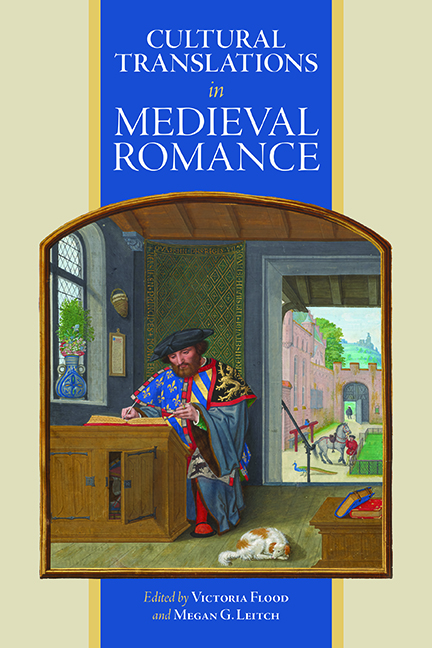Book contents
- Frontmatter
- Contents
- List of Contributors
- List of Abbreviations
- Introduction Insular Romance in Translation: New Approaches
- 1 Romantic Wales: Imagining Wales in Medieval Insular Romance
- 2 ‘Something remains which is not open to my understanding’: Enigmatic Marvels in Welsh Otherworld Narratives and Latin Arthurian Romance
- 3 The Supernatural Company in Cultural Translation: Dafydd ap Gwilym and the Roman de la Rose Tradition
- 4 Women and Werewolves: William of Palerne in Three Cultures
- 5 ‘Better a valiant squire than a cowardly knight’: Gender in Guruns strengleikr (The Lay of Gurun)
- 6 ‘Vinegar upon Nitre’? Walter Map’s Romance of ‘Sadius and Galo’
- 7 The Three Barriers to Closure in Hue de Rotelande’s Ipomedon and the Middle English Translations
- 8 Trojan Trash? The Seege or Batayle of Troye and the Learning of ‘Popular’ Romance
- 9 Poaching Romance: Fan Fiction Theory and Shared Medieval Narratives
- 10 Between Epic and Romance: The Matter of England and the Chansons de Geste
- 11 Geographies of Loss: Cilician Armenia and the Prose Romance of Melusine
- 12 ‘All this will not comfort me’: Romancing the Ballad in The Squire of Low Degree
- 13 Merchants in Shining Armour: Chivalrous Interventions and Social Mobility in Late Middle English Romance
- Index of Manuscripts
- General Index
- Miscellaneous Endmatter
8 - Trojan Trash? The Seege or Batayle of Troye and the Learning of ‘Popular’ Romance
Published online by Cambridge University Press: 07 October 2022
- Frontmatter
- Contents
- List of Contributors
- List of Abbreviations
- Introduction Insular Romance in Translation: New Approaches
- 1 Romantic Wales: Imagining Wales in Medieval Insular Romance
- 2 ‘Something remains which is not open to my understanding’: Enigmatic Marvels in Welsh Otherworld Narratives and Latin Arthurian Romance
- 3 The Supernatural Company in Cultural Translation: Dafydd ap Gwilym and the Roman de la Rose Tradition
- 4 Women and Werewolves: William of Palerne in Three Cultures
- 5 ‘Better a valiant squire than a cowardly knight’: Gender in Guruns strengleikr (The Lay of Gurun)
- 6 ‘Vinegar upon Nitre’? Walter Map’s Romance of ‘Sadius and Galo’
- 7 The Three Barriers to Closure in Hue de Rotelande’s Ipomedon and the Middle English Translations
- 8 Trojan Trash? The Seege or Batayle of Troye and the Learning of ‘Popular’ Romance
- 9 Poaching Romance: Fan Fiction Theory and Shared Medieval Narratives
- 10 Between Epic and Romance: The Matter of England and the Chansons de Geste
- 11 Geographies of Loss: Cilician Armenia and the Prose Romance of Melusine
- 12 ‘All this will not comfort me’: Romancing the Ballad in The Squire of Low Degree
- 13 Merchants in Shining Armour: Chivalrous Interventions and Social Mobility in Late Middle English Romance
- Index of Manuscripts
- General Index
- Miscellaneous Endmatter
Summary
It may seem a contradiction in terms to think seriously about the ‘learning’ of romance, especially so-called ‘popular romance’. Despite the genre's increasingly acknowledged fluidity and open-endedness, and notwithstanding our greater understanding of the social, cultural, and material contexts for its production and dissemination, romance is still implicitly characterised as ‘not learned’, positioned on the opposite end of the intellectual spectrum from the kind of religious and classically derived texts that numerically dominate surviving medieval literature. ‘Popular’ romance or ‘pulp fictions’, the lowest of this ‘low’ genre, is surely beyond the cerebral pale: seen by some modern critics as ‘degenerate in form and style’, a ‘banal ⦠pleasure’, such romances are tacitly equated with a lack of interest in ‘learned’ literary culture. Even when medieval romance seeks to instruct in its hagiographic or more generally didactic modes, it is rarely seen as ‘learned’ in the traditional textual sense outlined above. This is partly because of the lesser intellectual status still denoted by English as a language in contrast to Latin and French, an anxiety seen clearly in other English romances, for example Of Arthour and of Merlin. And yet romance texts share with aspects of that more elite and often Latinate/French linguistic culture the vital intellectual habit of translatio studii, retelling an old work for a new audience in a different context or language, whether that story be a prestigious narrative of the ancient pagan world, a Christian tale of an Arthurian knight, a crusading hero, or a vernacular presentation of Christian doctrine. If we conceive of ‘learning’ as not just including a knowledge of inherited material but also referring to the various practices involved in retelling such material, then this allows us to consider the ways in which popular romance may be integrated into the wider intellectual framework of later medieval literature, and to recuperate it from the charge of being merely ‘a collection of “dirty books”’ with a limited relationship to literary cultures. I shall consider the Middle English Seege or Batayle of Troye (SBT) and its presentation of learning from a wider perspective, therefore, focusing not only on its relationship with classical material but also on the generic and stylistic features of that relationship, in an attempt to demonstrate that its intellectual and literary translatio is more diverse than has been previously imagined.
- Type
- Chapter
- Information
- Cultural Translations in Medieval Romance , pp. 153 - 172Publisher: Boydell & BrewerPrint publication year: 2022



